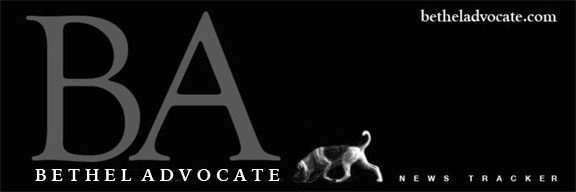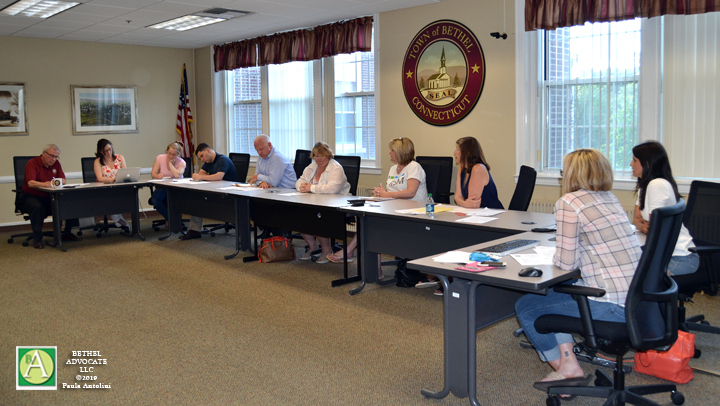
Report by Paula Antolini, June 20, 2019, 2:09PM EDT

(Scroll down to view videos of RELIGIOUS HOLIDAY DISPLAY MEETING June 6, 2019 and time and date of tonight’s next RELIGIOUS HOLIDAY DISPLAY meeting.)
*****
THE FIRST OFFICIAL MEETING OF THE “RELIGIOUS HOLIDAY DISPLAY COMMITTEE” on June 6, 2019
The first “official” meeting of Bethel’s “Religious Holiday Display Committee” took place on Thursday, June 6, 2019, after the committee members were finally sworn in by town clerk Lisa Bergh. (Danielle Monroe and Robin Dowding were sworn in earlier, said Bergh.) First Selectman Matthew Knickerbocker was acting Chairman. (Present at the June 6th meeting were: Frances Pulle, Holly Heslin, Mary Shepheard, Aaron Vincent, Danielle Monroe, Diana Naddeo, Tim Martin and Robin Dowding. First Selectman Knickerbocker was the acting Chairman until an official Chairman was elected during the meeting.)
We previously reported on May 2, 2019, in the article entitled, “Bethel’s ‘Religious Display Committee’ Was Never ‘Officially Appointed’ by the Bethel Board of Selectmen, or Sworn In, as Per Legal Procedures,” that this same committee had two meetings in the previous months before June 6th, but they did not “technically” exist, according to state statutes and the town Charter. They even elected officers and approved previous meeting minutes and future meeting dates. Now none of this should officially count, but that is still up in the air and First Selectman Knickerbocker was questioned about that by Committee member Fran Pulle and also Bethel Advocate.
Knickerbocker stated that because the committee members did not vote on anything, other than elect officers at the April and May meetings, they did not have to “start over.” He did not address the issue brought up to him that the first two meetings were “technically” not on the record because members had never been sworn in.
Knickerbocker also was asked, “How did this happen?” (How did a town committee operate for 2 months, have meetings, elect officers, even attended by First Selectman Knickerbocker, and yet it was not official because members were never sworn in? How did the town clerk not know about the committee?)
At first Knickerbocker said, “I’m not going to answer any questions … I’ve explained it. That’s it.” He was referring to a long conversation he had with the Religious Display Committee BEFORE the meeting officially started, where he said, “Actually I’m not going to open up the meeting just yet. In a couple of minutes Lisa is going to swear you in, and I wanted to explain why that wasn’t done in the first part. It’s very much a sensitive topic, some people are very passionate about it. There is a rule, there is a law, a state statute in the state code book that says that any board or commission at every level, you know, whether it’s local government, state government, whatever, whether it’s elected or appointed, has to have a certain balance between parties, Republicans and Democrats, or Independents or Unaffiliated. So I was trying to avoid that. Quite frankly I got slapped a little bit by the town attorney on that. But the reason I wanted to do that is that I wanted anybody who raised their hand and said I want to be a part of this to have an opportunity to do it.”
Knickerbocker continued, “It’s the same reason why I haven’t gone about trying to establish an arts commission because some things, some functions that we do, have nothing to do with politics, nothing to do with parties, and yet we have the burden of the state law which is also embedded in our Charter that says you must not have more than two-thirds of the seats belong to any one party, and they consider even if you’re not a member of a party, if you’re Unaffiliated the state considers that a party even though you’re not. It’s really kind of a ridiculous law that has probably outlived its usefulness, but it forces political considerations into areas that, you know, I don’t think they should be and I think you probably agree.”
Knickerbocker continued, “And the second thing is I just wanted this to be more of an informal discussion group because you’re going to make a recommendation. The Board of Selectman has the burden of making the final decision but we’re counting on you to, you know, discuss this thoroughly and come up with a recommendation. So we thought that not having this be a formal committee would facilitate that conversation. So as I said, the town attorney got wind of that, slapped me around a little bit, corrected my mistake, and said no, it doesn’t matter what it is, that you have to appoint people to be sworn in by the town clerk. You have to sign the big book which will be in the vault forever, and you will be immortalized as a member of this committee. We did check everybody’s party affiliation and we’re good. it complies with the law just by coincidence. I don’t have to ask anybody to step down or not participate because we had the wrong balance or violated state law.”
*****
Knickerbocker announced that Anthony Orrico has a new job and cannot make the committee meetings, so he has stepped down and will not be a member of the committee.
“The Charter and state law gives me the ability to open a meeting and chair it. The only thing I can’t do is vote. So as an ex-officio member I will be your chair and conduct the meeting according to the agenda that’s been posted,” Knickerbocker said.
After the meeting officially began, when pressed to repeat his explanation on record, by Bethel Advocate, and also committee member Fran Pulle asking, “I’d like to know also how that mistake was made.” Knickerbocker then answered, “I’ve explained it.” and said there was no need for further explanation.
When it was pointed out that Knickerbocker’s last explanation was off the record and we needed it to be on the record, he then said, “OK so we’ll put this on the record. I decided that I wanted to have more of an informal committee to facilitate discussions as well as not be burdened with political affiliations, which I think is completely irrelevant in this context. So I structured the committee that way, with the approval of the Board of Selectman, with the other two Selectmen, by the way.”
Knickerbocker continued, “I was informed by the town attorney that it is improper to do it that way, that any committee has to be formalized, has to be sworn in, and has to comply with the state law. So we checked everybody’s political affiliation and found that we were within the guidelines, within the law of the state statutes anyway, so that political consideration became irrelevant.” He said, “So it’s being corrected and that’s where we are today.”
*****
PUBLIC COMMENTS
Bethel resident Victor Holomakoff stated, “I just wanted to be present because I had heard through the grapevine that certain things were going on with the placement of the Nativity scene, which you know, the church has been involved in for a long time and we just went through a lot of, you know, financial upgrading of that this past year, so I just want to be kind of kept in the loop of where we’re going to stand at the end of it. So, with the placement of that, whether we are still going to be able to do that or we’re not going to be able to do that.”
Bethel resident Marlene DiMarco said, “New York City allows a life-size Nativity in Central Park, a Catholic organization represented here, and if a city as diverse as New York City can be tolerant of a Christian symbol on public property, I think that we need to see what’s wrong with our town that we have so much animosity and so much discord over a symbol of peace.” She continued, “And I see a lot of different arguments, you know, coming around town over everything, arguing over everything, and some of it is hurtful and hateful and personal attacks on good people, and I think everyone should stop and see where those attacks are coming from, and if it’s somebody that you’re affiliated with, reel them in because it’s ugly.”
*****
First Selectman Knickerbocker stated that the item on the agenda referring to voting on approving the meeting minutes of the April meeting were irrelevant.
First Selectman Knickerbocker led the Committee in discussing open areas for displays, commenting many times that the Committee would need to speak to the town attorney on many issues mentioned. He gave what he described as his “personal opinion” that this was “a difficult topic for this group.” he said, “I think you should, and this is a recommendation on my part, I think you should have, or should start with the fundamental question of yes or no…. you may wish to think about this a while, you may want to have me bring in the town attorney for your next meeting, formulate questions for him, because as has been described to me, and multiple attorneys, and also by the readings I’ve done, to the point that was made by Mrs. DiMarco, displays of this nature can be placed on public property, but if they are, you cannot edit any other display.”
Knickerbocker said, “In other words, you can allow displays of a religious nature, specifically religious, so to your point earlier (pointing to Robin Dowding), this is a religious display committee, as we already have other zoning regulations in place for displays, banners, signs, things of that nature. This specifically involves religious displays because of the Constitutional issue that’s involved in it, the previous court rulings that have allowed them in some places and disallowed them in others. So the central question is, do you wish to continue to allow them on public property? And what you have to debate, and what you have to understand is that, and again, I totally encourage you to list all your questions and we can arrange for the next meeting to have the town attorney in here so you can question him directly, as well as bringing any more resources that you might like.” He continued, “But if the answer is yes, then you must allow, the Town of Bethel must allow other forms of display that other people may or may not approve of, to use the specific example from the last holiday season.”
Knickerbocker said, “I want to thank the people who worked together to allow the secondary display to go up, the banner, it was a Happy Holidays banner. I know there was an objection to the word Atheist on it. We cannot edit that.”
Committee member Robin Dowding did not think all holiday symbols are Christian symbols. She asked, “Would the Nativity or the Christmas tree, or I don’t know what you call it, everything is so politically correct… certain people may interpret that as a Christian symbol. Personally I don’t. I look at all the symbols as part of the holiday…I don’t look at that and say that’s a Christian symbol…it was not labeled as a Christian symbol. There’s no wording on that, that said, you know, the Christians of Bethel welcome you to this holiday season.”
Dowding continued, and discussed the issue of the word “Atheist” or other words on banners. She felt that the Atheist banner was offensive. She said, “In the reading that I have done, I can’t recall exactly where I had seen it, it did state that if a church was taking specific ownership of that, that was not considered appropriate, as opposed to a public display in recognition of the holiday. I had a problem with the banner because it went specifically for Atheists. It didn’t say Happy Holidays. That would be like having a banner on top of the Nativity saying From Your Happy Christian Neighbors. I found it offensive. It’s not my fault that the Atheists don’t have a quote symbol of their beliefs the way other religions may have symbols of their beliefs, a Menorah, a Nativity a Christmas tree, Santa Claus, colored lights vs. white lights, you know it gets really silly. I thought the Nativity was very tactfully handled for a public space. I didn’t look at the Nativity and say that really should be on St. Mary’s front yard, or the Methodist church…it’s a symbol of the holiday just like of there is a Menorah.”
Knickerbocker replied, “I’m not going to cite case law but I’ve read that there are court cases that sided with you as a Nativity being a secular display, there are others that said by its very structure it is a religious display as is a Menorah. It means a specific religion and cannot be confused with any other religion”
Committee member Fran Pulle objected. She said, “I have to disagree with you because I went over the Supreme Court decisions and I believe I went through that at the last meeting.”
Knickerbocker said, “I am not taking a position one way or another I am citing what I just read.”
Pulle continued, “The latest cases, I’ll cite Lemon vs. Kurtzman that says it is not a religious symbol, that it’s been around so long it’s a cultural and historical symbol, and in some cases, you know, you can have candy canes and Santa Claus, or you can have it alone. And the lemon test is as long as it passes four different things, a creche can remain on public property, that it is no longer considered a religious symbol, it is considered ceremonial deism.”
Pulle continued, “You kind of like pretend. In various Supreme Court cases that I looked at it said that it’s okay as long as you pretend, in other words we’re all pretending, you can look it up.” Knickerbocker said, “I’m questioning the use of the word pretending.” Pulle replied, “That’s the actual word that is used in various cases. They said it’s ceremonial deism. In other words we are pretending that it’s not religious, and as long as we do that it’s considered not religious because it’s been around so long that it’s historical and cultural.” Pulle said, “As long as it passes the lemon test, and I can go through that, then it is not religious and it can be on town property. And they actually said, ‘There is no concrete identifiable answer for determining what goes on town property,’ and they said ‘create whatever policy you want’ then of course ‘show it to your town attorney,’ and this is citing 7or 8 cases, Supreme Court cases, so it’s really a muddle but it’s not considered religious, not anymore.”
A discussion between Knickerbocker and Pulle ensued. Knickerbocker replied, “I think the main point is if you’re going to allow it you have to allow others as well.” Pulle replied, “Not necessarily.” Knickerbocker said, “That’s not what I’ve been instructed by the attorneys.” He added, “So bring your cases. This is the point we were [at] last November, we have no right to say no to another display. That is very much agreed upon legal doctrine right now as I’ve been informed, and again, we’ll bring the attorney in.”
Chairman Holly Heslin, who earlier indicated she is an attorney, said, “As long as the other displays also pass the lemon test, that’s the point. You have a law in place that says if it satisfies A, B and C, it’s 3 prongs not 4, and if all 3 are satisfied Frances … it’s 3 prongs and if all three are satisfied then … it doesn’t mean you’re on that end, it just means it’s Constitutional, it’s allowable.” “But still, my feeling about this committee is that even if’s it’s Constitutional and allowable, is it desirable, is it practical, that’s the whole point.” Pulle added, “Is it neighborhood friendly?” Heslin replied, “That’s the whole point. Problem 1, is it legal and Constitutional, problem 2, is this what we want? Do we want twenty displays on a small little piece of land?”
“What are those three prongs?” Knickerbocker asked.
Heslin answered, “The 1st is that the display must have a legitimate secular purpose, 2, not have the primary effect of advancing or inhibiting religion, and 3, not result in an excessive entanglement of government and religion.” Pulle said, “Government is not involved, right?” Heslin answered, “Right, Well entanglement of it, so there’s not a pull, we’re creating a pull.” Pulle stated, “There’s no coercion or endorsement.”
Committee member Mary Shepheard asked, “What was the second one?”
Heslin replied, “The second one is, ‘Does not have the primary effect of advancing or inhibiting another religion’ or its own religion. So it’s not saying Pro-hey, let’s all be Catholics, and Christians, let’s all be Jews, or Atheists, it’s kind of just there.”
“What was the third prong again?” Knickerbocker asked. Heslin replied, “That there’s not a result in an excessive entanglement of government and religion. So ultimately what Frances said is that the Town of Bethel would not be advocating specifically for any one.”
Committee member Tim Martin said, “In a general framework of the section here (looking at document just discussed), it makes it sound like that if we allow it that we have to allow everything religious and non-religious. it specifically says that in here.” Martin said, “So if we have it and somebody wants to come and put a banner advertising their store…” Knickerbocker cut in, “No, non-religious refers to Atheism.” Committee member Robin Dowding asked, “Where does it say that?” Knickerbocker replied, “It’s up to interpretation. No we’re not going to, it doesn’t apply, well there’s already zoning regs as you’re probably aware, that apply to commercial signage.”
Martin said, “What if somebody just wanted to put any sign up and claim it’s for non-religious reasons, I just want to put my display up… not affillated with anything?” … “It almost seems that having regulations for a religious display does not make sense because of Constitutionality specifically addressing religious displays. But then it’s pouring over into the non-religious which should already be covered in he world of zoning and the world of everything else.” Knickerbocker replied, There are regulations already in place that prohibit signage, we have to deal with that too. The purpose of that sentence was not to exclude a person or group who put up a sign that is an Atheist.” Knickerbocker said, “I wouldn’t get too hung up on that because that all that nonreligious refers to.”
“We also have to talk about the number, the size, the placement,” Pulle said. Knickerbocker replied, “If your determination and recommendation is yes, we should allow it, then yeah, you’re right… not only that, but how to allocate it, and I’ll give you an example.”
Knickerbocker continued, “In one of the discussions we had with the town attorney one of the selectman said ‘Well I don’t see a problem with other displays, you know, we’ll just have the creche over here where it always goes, and then we can worry about where the other things go. And then the attorney said no, you can’t just arbitrarily say ‘Oh this one display gets the premiere location by the tree.’ ”
Knickerbocker said, “If it’s going to be an open system, whether you have a lottery or something, you can’t guarantee that any particular display is going to go in any particular place, you have to say, ‘These are the places that are open, these are the dates that we’re going to accept applications,’ and if you remember there were already guidelines as to size, you know, safety, things like that. Then you have to have some method of saying okay this is going to go here, however you want to do it, a lottery. But you can’t place favorites and say one gets a better location than another.”
Martin said, “The National Menorah in DC is in the same spot every year. So if I were to go down it’s public land, National public land… and say I wanted to be selected by lottery because I want to put a Nativity in that spot, they can’t say there’s a precedent for that spot or should they vacate that spot of it comes available, or they can’t ask you something, or somebody would not have tried that, whether it be the nativity or some others? Martin continued, “Clearly the Nativity that’s in Central Park, there are certain public space that is allocated, if for precedent, or so everyone knows where it is going to be, it’s not like, ‘So where the heck is it this year?’ Let me go check the lottery results to see where the Menorah is going to be. Now if that spot became available, sure, who’s going to get it?… you can’t just randomly pick. It doesn’t seem logical that you would have to move the display arbitrary random every year. We also have a limited number of spots. There are some spots that we physically can’t put certain displays.”
Other issues discussed were the number of display areas available.
Heslin commented, “I would just like to say that the law often doesn’t always reflect fairness either. It’s about what’s Constitutional. And as long as the Town of Bethel, and as long as this Committee and the Town of Bethel finds something that’s Constitutional and has a good reason … and I’m sitting here as just a regular Committee member and trying not to wear my lawyer hat, but whether it’s precedent or you have good reasons as to why… because we know the elephant in the room is the creche, being in that place it’s been every year, and that’s created a precedent. And the fact is that as long as the Town of Bethel, as long as it’s Constitutional, it passes the lemon test. And number 2, the Town of Bethel and those appointed to make these decisions have a good reason for keeping it there. it doesn’t matter that it might not be fair to other smaller displays, like they don’t get that spot, just like the menorah always gets that spot… I don’t think it should be about everybody getting equal access and rotating, it’s really about what makes the most sense. Because to me it wouldn’t make sense to move the creche to somewhere it doesn’t fit spatially and then just put a lollipop sign where it is. That makes sense to me.” Issues of electrical power needed for some displays and safety were also discussed.
Committee member Danielle Monroe stated, “I would just be interested to know how that reasonable decision gets made as to who gets that spot. And certainly there is a long standing tradition of having that one there. Again if another group wanted to come in regardless of what that affiliation is, I’m not sure what the solid argument is to say that they get to maintain that real estate vs. somebody else.”
“That would be up to the town to prove it is not arbitrary or capricious…that would be a violation” answered Heslin, “But if there are sound reasons why the creche works there, and it’s Constitutional, you know, I think you satisfy it.”
“Well let me play devil’s advocate with you and test your thinking on that,” Knickerbocker said, “Suppose we have the creche where it has been and someone wants to put up, you know, the Satanic group, which by the way, was nothing more than the sculpture of an arm, holding an apple with a circle around it and it said ‘knowledge’ at the base. But let’s say they wanted to put up a fairly large display and we say there’s no room over there because the creche is already there and so it’s going to go to Bennett Park. So who’s going to see it? I mean do we wind up in court fighting that argument?”
Issues of time frame for some displays to be on a location, sharing real estate, time of year, safety and percentage of population that is a certain religion vs. other religions, were also discussed. “Why are we being swayed to move the creche if the majority of then people are Christian?” said Pulle.
“What about putting it to a vote of the people? Popular vote?” said Committee member Robin Dowding.
Danielle Monroe commented, “I don’t think that Constitutionality and discrimination issues should be voted upon so I’m going to have to put my voice out there and say that, that’s not a good precedent in my opinion, to put something like that to a vote, because minority rights matter.” She went on to say, “You’re advocating for having a vote which means the majority would rule.” There was then discussion about what the percentages of Atheists were in Bethel vs, other groups.
Heslin said, “I just think it is inappropriate to pass on to the citizens of Bethel a decision that, there’s more to it than just do you like the creche… there’s also zoning regulations, safety concerns and so I think … listen, majority rules in everything that we do in life, including the law however in this particular context we have people who were out in position of more information and knowledge than we do. And I certainly don’t want to vote to put something somewhere that would be unsafe. So I think it would be inappropriate to out it to a vote.”
“I would like us to be as inclusive as possible to the minority,” said Martin, “without the minority trying to push the majority either, not just trying to flip it for the sake of flipping it You need to be as inclusive as you can.”
Monroe replied, “My primary concern was not removing the creche…” Martin replied, “A lottery removes the creche. A lottery removes a decades old tradition…” Monroe said, “My primary concern has been, as evidenced by the meetings we did have leading up to this, that there is a significant portion of the town that is not interested in sharing any real estate with certain groups, and will be very displeased if we try to put a different display on the same real estate as the creche. So that to me is a big issue that our town needs to come to terms with or not, by not having the issue.”
Further discussion covered practicality of locations for displays, placing displays near the road in Bennett or Meckauer Parks, or contacting the library for space, but they have to set their own rules, and overlapping holidays.
Also there are only three locations possible for displays that was decided upon by Bethel Park and Recreation and Bethel Planning and Zoning Commission, Dionne Craig stated.
A heightened reaction happened when Heslin mentioned the word “lawsuit” and Monroe reacted strongly, and a discussion about lawsuits ensued. (in video, Part 2, below) Heslin stated, “You know, to be devil’s advocate, sometimes elected officials, or volunteer officials on committees make these decisions that are not legally trained and are scared by people who threaten lawsuits.” Monroe angrily reacted, and interrupted with, “Let me just get that on the record because I am tired of being told that.” The rest of the statement was not able to be distinguished because many people started talking at once.
When Pulle questioned Monroe about where people got the idea of the “message” from about what exactly had happened last year during this controversy, Monroe said, “I think I can answer that question but let’s not do it on camera.”
MUCH much more discussion went on, view the three-part video account below (scroll down). Many issues to discuss!
Also come to tonight’s 2nd meeting at 6:30PM in Room A of the CJH Municipal Center and give your comments.
*****
A list of questions was compiled by Dionne Craig to be answered by Town Counsel and Planning & Zoning, as follows:
- What areas of land are available
- What is constitutional in deciding what/ how displays will be chosen and not necessarily fair
- Define the Lemon Test
- The Lemon Test— Who makes the decision
- How do we determine/ objective decision—is there a standard or will criteria be made?
- Why does the majority have to conform to the minority
- Can a display be reserved based on history or grandfathered to a spot based on needs— power, safety ect.)
- Does the precedent matter Time limit—what is the appropriate time limit for each display.
- What times of the year do we open the area for displays?
- Process for deciding the limit of approved spots on a location.
*****
HISTORY OF PREVIOUS TECHNICALLY UNOFFICIAL PREVIOUS “RELIGIOUS HOLIDAY DISPLAY” MEETINGS
One meeting took place on Thursday, March 14, 2019. (“Present were: Anthony Orrico, Frances Pulle, Sarah Courteau, Robin Dowding, Mary Shepheard, Aaron Vincent, Diana Naddeo and Danielle Monroe. Absent: Teresa Fogel, Holly Heslin, Pat Daubert and Tim Martin. Also in attendance was First Selectman Matthew Knickerbocker.”) At this meeting First Selectman Matthew Knickerbocker “called the meeting to order” and also “shared with the committee the duties and expectations of the committee,” according to meeting minutes, recorded by Dionne Craig. Election of officers was held off until the April meeting, but meeting dates were voted on and approved for March 14, April 11, May 9 and June 13.
Another meeting took place on Thursday, April 25, 2019. (“Present: Anthony Orrico, Frances Pulle, Holly Heslin, Mary Shepheard, Aaron Vincent, Danielle Monroe, Diana Naddeo, and Tim Martin. Absent: Robin Dowding, Sarah Courteau, Teresa Fogel, and Pat Daubert.”) Anthony Orrico called the meeting to order. Election of officers was done as follows: Mary Shepheard, Secretary; Anthony Orrico, Chairman; Frances Pulle, Vice Chairman. Meeting Minutes from Thursday, March 14, 2019 were approved. Thery cancelled the May 9 and June 13 meetings and approved the next meeting date as June 6, 2019.
According to April 25th meeting minutes, recorded by Jolene Drukker, Chairman Anthony Orrico led the Committee in discussing several key points raised in a memo to the Committee, from First Selectman Matt Knickerbocker, including but not limited to:
–should any/all displays be allowed on Town property;
–what would a reasonable and allowable display time frame be;
–the three ( 3) open areas available for consideration of public displays. The Committee requested additional information be provided from the Director of Bethel Parks Recreation:
–Site dimensions, and any restrictions, if any, for each site.
–Current guidelines and criteria, if any, as to number/size/ type of displays, and location of display(s) on each site.
*****
THE AFTERMATH
Early in the afternoon on May 1st the members of the recently (thought to be) appointed Bethel “Religious Display Committee” found out the committee does not legally exist after receiving an email from First Selectman Matthew Knickerbocker’s office administrator, Dionne Craig, telling them they had to come into the office to be sworn in. The Religious Displays Committee had not been “appointed officially by the Board of Selectmen” even after holding two meetings in the past months, the first of which Knickerbocker attended.
In an email dated May 1, 2019, 2:05PM, Dionne Craig sent an email to committee members, under the subject heading “Swearing in, that reads: “Sorry to miss the meeting last week. I have everyone’s email and phone number, please respond back to this email with you address. Also, at your earliest convenience and before the next meeting, stop by the Town Clerk’s office to be sworn in. It will only take a minute.“
Lisa Bergh, who knew nothing about the committee’s existence, sent an email to the committee members once she became aware of it, after they had two unofficial meetings, under the subject heading “Swearing in,” dated May 1, 2019, 4:14PM, that read, ““Technically you have not been appointed officially by the Board of Selectmen as of yet, therefore please refrain from coming in to my office to be sworn in. It is my understanding that this will be done at the next Board of Selectmen’s meeting. You will be notified at that point to be sworn in.”
*****
Finally on Thursday, June 6, 2019 it was made official, committee members were sworn in, and the legal first meeting began, as stated above.
*****
VIEW VIDEOS OF RELIGIOUS HOLIDAY DISPLAY MEETING June 6, 2019, BELOW:
Religious Holiday Display Committee – Part 1 – June 6, 2019
Religious Holiday Display Committee – Part 2 – June 6, 2019
Religious Holiday Display Committee – Part 3 – June 6, 2019
*****
VIEW PHOTOS OF RELIGIOUS HOLIDAY DISPLAY MEETING June 6, 2019, BELOW:

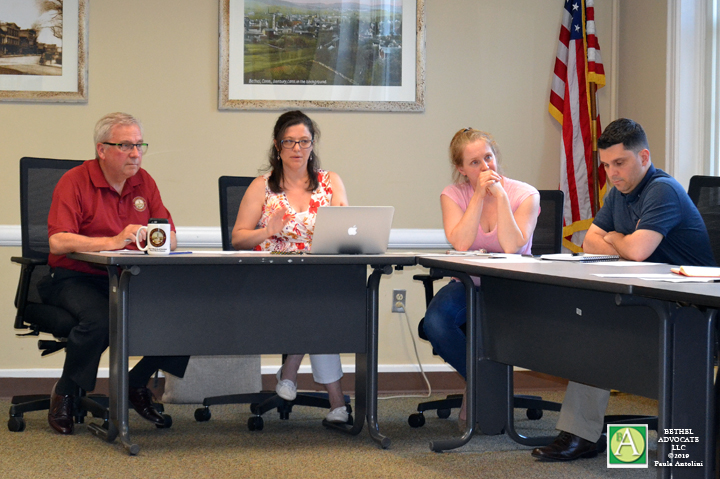
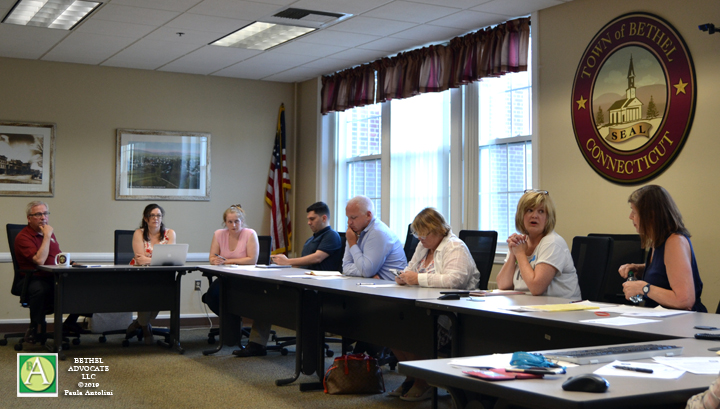
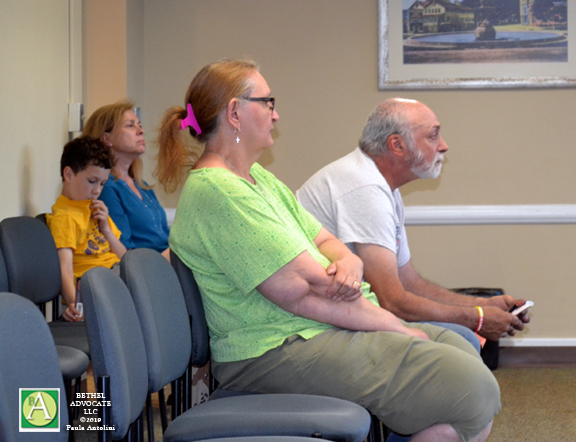
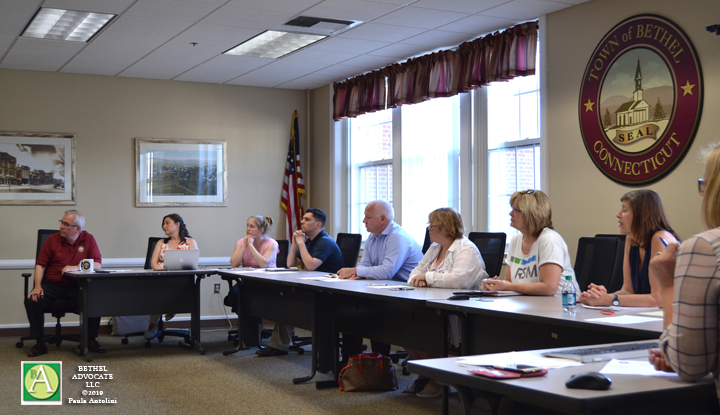
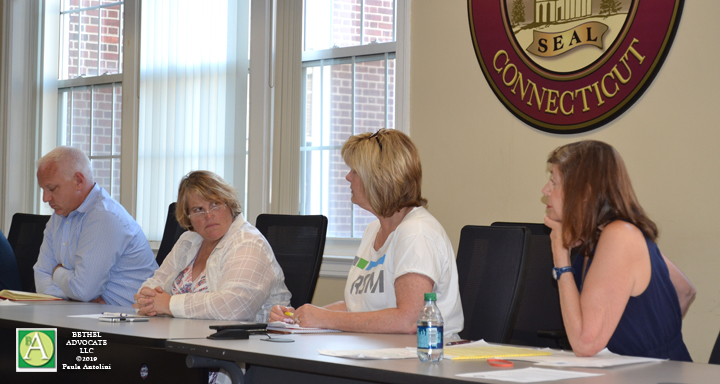
###
